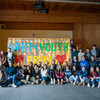"When people are free to do as they please, they usually imitate each other." — Eric Hoffer
During Friday evenings in my childhood home, an old Electro-Voice reel-to-reel tape recorder filled our living room with strains of the Kings Heralds, Del Delker and other Adventist artists. It wasn't stereo, but its powerful influence created synaptic pathways I still recall.
Music is still an important part of my experience. But the other day I was listening to some contemporary Christian music, when suddenly it all started to sound the same. Every voice, every message, seemed reminiscent of the last. Frustrated, I went downstairs and dug around in my treasure trove of vinyl LPs. I pulled out several and put them on my turntable — an ancient audio device held dear by some Baby Boomers. Ah, the relief — the old tunes refreshed musical memories of years past.
And then, a strangely familiar feeling: Those old songs began sounding alike, too.
In every era, sacred music has often mirrored common styles and sounds of society. My vinyl albums of Adventist artists from the 60s and 70s groove to sounds first made trendy in the secular arena. There is no coincidence that Walter Arties mimics Johnny Mathis and other crooners of the past; the Wedgwood Trio — take your pick from the Kingston Trio or other such folk groups. Take Three sounds suspiciously like Peter, Paul and Mary.
We all crave success, so it is natural to copy what is already a winner. I find the endless spate of television "reality" shows are such an effort — ad nauseum.
I suppose there's nothing inherently wrong with imitation — be it music, entertainment or vegemeat. But, frankly, has this ability to imitate aided our divine calling? Has it enhanced or diminished the Adventist mission in our world?
The words of an unknown scribe ring in my ear: "He who never walks except where he sees other men's tracks will make no discoveries."
Do Adventists have what it takes to become leaders instead of followers — to use God-given creativity to go beyond what everyone else is doing? Our history says "yes." Our pioneers were innovators — unafraid to be unique. But while the Lord tarries, we run the risk of becoming society's own version of background noise. In our efforts to fit in, some of us have passed up brilliant blue and vibrant red. We've settled for beige.
While imitation may indeed be the sincerest form of flattery, it is also the surest path to obscurity. Unless, that is, we find a new Source for imitation.
Perhaps Ellen White had this in mind when she wrote: "We must free ourselves from the customs and bondage of society, that when the principles of our faith are at stake, we shall not hesitate to show our colors ... Do not imitate men. Study your Bibles, and imitate Christ," (Our High Calling, p. 345).
Preach it, Ellen. Now there's an exhortation worthy of imitation.
"We run the risk of becoming society's own version of background noise. In our efforts to fit in, some of us have settled for beige."










